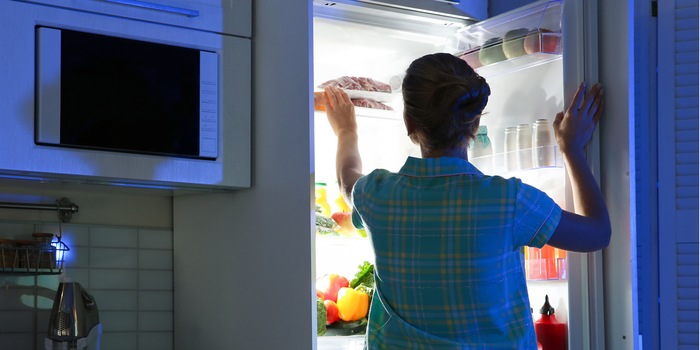
Nighttime meals increase risk of diabetes
People who work at night become diabetic more often. They may be able to avoid this by eating only during natural daytime hours.
Eating regularly at night increases the risk of developing diabetes type 2. Eating meals only during the day helps to curb this risk - even if the sleep rhythm is shifted. This is the conclusion of a team of researchers led by Sarah Chellappa of Harvard Medical School in Boston in the journal "Science Advances".
Chellappa and her team conducted a study with 19 participants (seven women and twelve men). The subjects spent two weeks in a tightly controlled laboratory environment in which the light-dark phases shifted progressively until they differed by twelve hours from the natural times of day. This forced disruption of the sleep-wake rhythm was used to simulate the effects of nighttime shift work.
Ten participants received their meals adjusted to the changed daily schedule, i.e. also during the natural night hours. The remaining nine subjects were only allowed to eat during the natural daytime hours - despite the shifted sleep-wake rhythm.
Late eating irritates the metabolism
In the first group, which ate at night, the blood sugar level increasingly decoupled from the core body temperature, as the team observed: While the body temperature rose and fell in a constant rhythm, the blood sugar fluctuations were out of sync by twelve hours. The researchers interpreted this as a sign that the participants' internal body clocks diverged: there had been a mismatch between the central clock in the brain and the organ-specific clocks of the liver or intestine. "The data show: While the central pacemaker was still set to Boston time, some peripheral clocks, such as those in the liver, had dramatically changed to a new time zone," said Frank Scheer, one of the scientists involved.
In addition, the participants who ate nightly meals had limited control over their blood glucose levels. After eating, the blood glucose level rose more sharply and remained elevated for longer; the release of the blood glucose-lowering hormone insulin was delayed. Over the entire observation period, these subjects had an increased mean blood glucose value.
In contrast, the subjects who only ate food during the natural hours of the day did not experience these effects - despite simulated night work: Neither a decoupling of the body clocks nor a worse blood glucose control occurred.
It has long been known that frequent or permanent shifts in the sleep-wake rhythm, for example in the context of shift work, increase the risk of diabetes. Based on their study, the scientists led by Sarah Chellappa suspect that the altered eating behavior of affected individuals is primarily responsible for this - in particular, taking meals at night. If night workers would continue to limit their eating times to the natural light phase, this could possibly help avoid a disturbance of the sugar metabolism and help to keep the internal body clocks in sync, the researchers write.
Spectrum of Science
We're partners with Spektrum der Wissenschaft and want to make sound information more accessible to you. Follow Spektrum der Wissenschaft if you like their articles.
<!-- small:Original article on Spektrum.de -->
Titelbild: Shutterstock
Experts from science and research report on the latest findings in their fields – competent, authentic and comprehensible.
From the latest iPhone to the return of 80s fashion. The editorial team will help you make sense of it all.
Show all